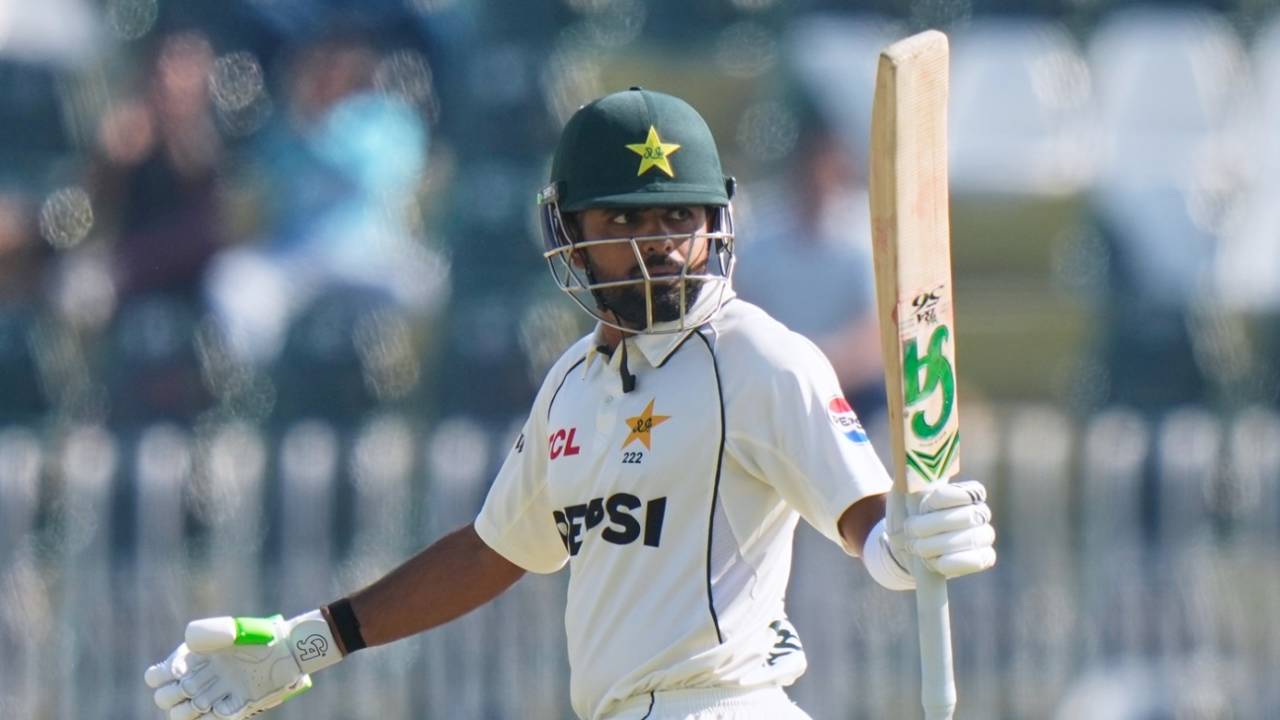Mahmood bemoans another Pakistan collapse: 'This is not acceptable'
"This is the fourth time in two Tests that we've lost wickets lower down the order cheaply. We need to take responsibility."
Danyal Rasool
Oct 23, 2025, 11:55 AM
Babar Azam notched up a half-century on the fourth morning but fell soon after • AFP/Getty Images
Pakistan's head coach was left to bemoan a familiar flaw with the team's performance, pointing to his side's first-innings collapse as the turning point in the game. After the Test, which South Africa won by eight wickets, Azhar Mahmood said Pakistan had specifically discussed this at their training camps, and that it was "not acceptable" that this kept happening.
"The first innings collapse was where it started," he said at the post-match press conference. "We lost 5 for 17. We should have posted 400-425 there, which was the position we'd put ourselves in. Agha and Rizwan were building a partnership which we couldn't utilise.
"This is the fourth time in two Tests that we've lost wickets lower down the order cheaply. This is not acceptable, and we need to take responsibility. We spoke about this at our two camps. Whenever your top players score 270-300, the contribution from the lower order really matters."
The only thing more reliable than Pakistan's late-order collapses this series has been a senior player or coach criticising those collapses. Midway through the first Test, Mahmood was fiercely criticial of Pakistan's first innings collapse which saw then lose their last 5 for 16, slumping from 362 for 5 to 378. Following the game, captain Shan Masood highlighted the issue once more after Pakistan lost their final six for 17 in the second innings.
But forewarned has not proved forearmed. The second Test saw the same issues prop up in each innings. On Thursday, Pakistan began at 94 for 4, but soon crumbled to 105 for 8, losing their final six for 43 to set South Africa up for a straightforward chase.
"You also have to give credit to opposition," Mahmood said. "South Africa were much better than us in this department. We could have taken the lead but credit goes to Muthuswamy, the way he played; his shot selection was perfect. He put on 70 with Maharaj and 98 with Rabada. If you play with a quality team and you give them several chances in a brief period of time, they will punish you. That's what happened and we allowed them extra runs.
"You have to work on your game and know your scoring shots. You can learn from the opposition. Muthuswamy scored primarily from the sweep and reverse sweep. You should know your scoring options. When we went to bat, we started blocking early. If we had rotated the strike and put pressure on them, we could have pushed them off their lengths. The way they did - though of course a low target made it easier. You need mental toughness; international cricket is all about how you cope with pressure."

Shan Masood and Aiden Markram pose with the shared trophy after the series ended in a draw•AFP/Getty Images
It was that innings from Muthuswamy which turned the Test around from one Pakistan controlled to one South Africa ran away with. With South Africa reduced to 235 for 8, 98 shy of Pakistan's first innings total, it looked like a repeat of the Lahore Test. But Muthuswamy, who finished unbeaten on 88, struck a 70-run stand with Keshav Maharaj, and another 98-run partnership with Kagiso Rabada to give South Africa a 71-run lead.
It set Pakistan up for what has now become a familiar phenomenon - the third innings implosion. In several Tests last cycle, Pakistan's third innings turned Tests which were relatively evenly poised to ones the opposition dominated by crumbling late on, leaving them with innings defeats or straightforward chases for the opposition. That was a feature in each of the three Tests Pakistan lost before their turn to spin wickets - two against Bangladesh and one against England - and it reared its head once more.
Mahmood admitted that was a concern, though believed Pakistan's calendar didn't help. "It is a concern that we have a poor record in our third and fourth innings. But if you play four Tests in a year and the team only gets together every six months, you don't have time to work on your game. We last played in January and our next Test is in March. These gaps are too long, and we'll have to play regular Test matches to cope with these situations."
Danyal Rasool is ESPNcricinfo's Pakistan correspondent. @Danny61000
